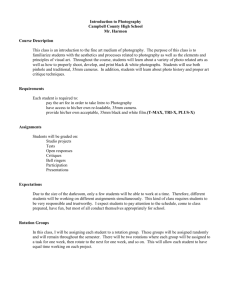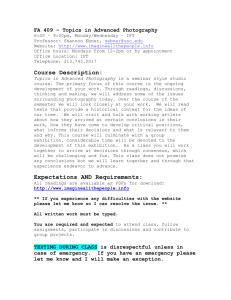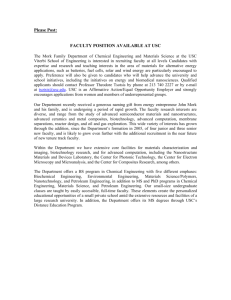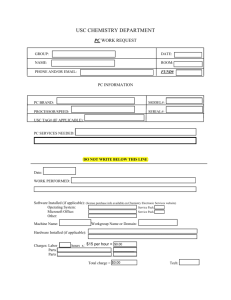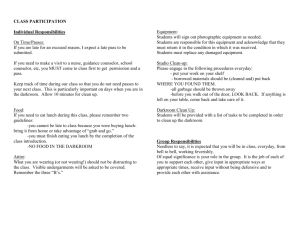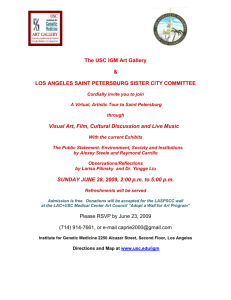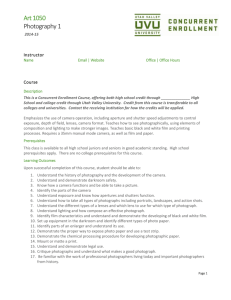Syllabus - imagineallthepeople.info
advertisement
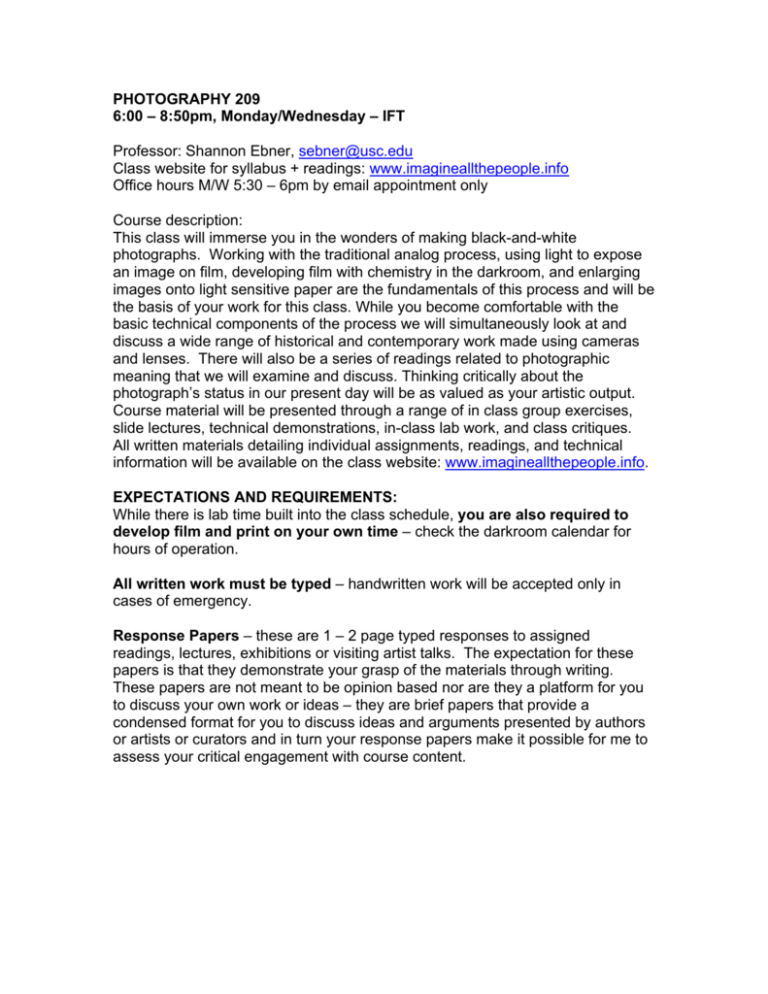
PHOTOGRAPHY 209 6:00 – 8:50pm, Monday/Wednesday – IFT Professor: Shannon Ebner, sebner@usc.edu Class website for syllabus + readings: www.imagineallthepeople.info Office hours M/W 5:30 – 6pm by email appointment only Course description: This class will immerse you in the wonders of making black-and-white photographs. Working with the traditional analog process, using light to expose an image on film, developing film with chemistry in the darkroom, and enlarging images onto light sensitive paper are the fundamentals of this process and will be the basis of your work for this class. While you become comfortable with the basic technical components of the process we will simultaneously look at and discuss a wide range of historical and contemporary work made using cameras and lenses. There will also be a series of readings related to photographic meaning that we will examine and discuss. Thinking critically about the photograph’s status in our present day will be as valued as your artistic output. Course material will be presented through a range of in class group exercises, slide lectures, technical demonstrations, in-class lab work, and class critiques. All written materials detailing individual assignments, readings, and technical information will be available on the class website: www.imagineallthepeople.info. EXPECTATIONS AND REQUIREMENTS: While there is lab time built into the class schedule, you are also required to develop film and print on your own time – check the darkroom calendar for hours of operation. All written work must be typed – handwritten work will be accepted only in cases of emergency. Response Papers – these are 1 – 2 page typed responses to assigned readings, lectures, exhibitions or visiting artist talks. The expectation for these papers is that they demonstrate your grasp of the materials through writing. These papers are not meant to be opinion based nor are they a platform for you to discuss your own work or ideas – they are brief papers that provide a condensed format for you to discuss ideas and arguments presented by authors or artists or curators and in turn your response papers make it possible for me to assess your critical engagement with course content. Attendance Policy for Photography Area: After missing the rough equivalent of 10% of regular class meetings (3 classes if the course meets twice per week and 2 classes if the course meets once per week) the student’s grade and ability to complete the course will be negatively impacted. • For each subsequent absence (excused or otherwise), the student’s letter grade will be lowered by the following increment: 1 absence over 10% equivalent missed = the lowering of the final course grade by one full grade. • Being absent on the day a project, quiz, paper, exam, or critique is due can lead to an “F” for that project, quiz, paper, exam, or critique. • It is always the student’s responsibility to seek means (if possible) to make up work missed due to absences, not the instructor’s, although such recourse is not always an option due to the nature of the material covered. • It should be understood that 100% attendance does not positively affect a final grade. • Any falsification of attendance may be considered grounds for a violation of ethics before the University Office of Student Judicial Affairs. • Tardies can accumulate and become equivalent to an absence (three tardies equal one absence). • Attendance will be taken at the beginning of each class. o Any student not in class after the first 10 minutes is considered tardy. o After a first warning, students who persist in the following disruptive activities: sleeping, texting, emailing or online browsing for purposes other than class research, will result in a tardy for that class session. o Students will be considered absent if they leave without the instructor’s approval before the class has ended or if they take unapproved breaks that last longer than 45 min. GRADING: B: A: C: D: Regular attendance and participation in critiques and discussions/lab time Resulting work from lab time reflects a handle on materials and methods as well as development of ideas and concepts All of the above with exceptional work Work consistently exhibits intellectual risk, as well as rigor Average work, infrequent participation and attendance problems Poor work, very infrequent participation and serious attendance problems F: Inc: Little or no work This grade does not exist 20% Class participation in discussions and critiques 20% Written responses for papers 10% Self-guided field trip for exhibitions/lectures (2 required, see above) 50% Quality of work for critiques Mid-term grades will be based upon the quality of your work, class participation, and attendance thus far. Statement for Students with Disabilities Any student requesting academic accommodations based on a disability is required to register with Disability Services and Programs (DSP) each semester. A letter of verification for approved accommodations can be obtained from DSP. Please be sure the letter is delivered to me (or to TA) as early in the semester as possible. DSP is located in STU 301 and is open 8:30 a.m.–5:00 p.m., Monday through Friday. The phone number for DSP is (213) 740-0776. Statement on Academic Integrity USC seeks to maintain an optimal learning environment. General principles of academic honesty include the concept of respect for the intellectual property of others, the expectation that individual work will be submitted unless otherwise allowed by an instructor, and the obligations both to protect one’s own academic work from misuse by others as well as to avoid using another’s work as one’s own. All students are expected to understand and abide by these principles. Scampus, the Student Guidebook, contains the Student Conduct Code in Section 11.00, while the recommended sanctions are located in Appendix A: http://www.usc.edu/dept/publications/SCAMPUS/gov/. Students will be referred to the Office of Student Judicial Affairs and Community Standards for further review, should there be any suspicion of academic dishonesty. The Review process can be found at: http://www.usc.edu/student-affairs/SJACS/. Roski admissions information ◄ (Not required for MFA or PAS graduate courses) For information and an application to become a Fine Arts minor, please visit http://roski.usc.edu/minors/ Please contact Antonio Bartolome at anbartol@usc.edu or 213-740-7567 with any questions about a minor in the Fine Arts. To become a Fine Arts major, please visit http://roski.usc.edu/undergraduate_programs/ Please contact Penelope Jones at Penelope@usc.edu or 213-740-9153 with any questions about majoring in FA. Applications are due October 1st and March 1st every year.” WEEKLY SCHEDULE: Week 1: 1/11 – Introduction / syllabus overview / materials list www.imagineallthepeople.info Seeing exercise: from chromatic to monochromatic For next class bring 10 organic materials (non-manufactured) smaller than 8x10 inches to Photogram 1/13 – Darkroom Tour and introduction with Morgan Cuppet First Assignment: Operations of walking: light in public as subject Demo: Photograms in the darkroom Due: 10 objects, 1 hand towel and closed toe shoes Reading for 1/20: “Where the Feeling and Everything Is” by Glen Ligon from Zoe Leonard’s Available Light, 2014. “Southward Bound, Reads Worstward Ho” by Lydia Davis from Varieties of Disturbance, 2007. Week 2: 1/18 – Martin Luther King’s Birthday – No Class 1/20 – Select your 5 best photograms to share with class ** Bring camera to class ** Demo: loading film, basic camera operation, F-stops and shudder speeds, camera’s light meter. Due: Reading response for Ligon and Davis (1-2 pages, typed) Reading for 1/25: “Walking in the City” by Michel de Certeau from The Practice of Everyday Life Week 3: 1/25 – Due: 1 roll of exposed film to develop Bring to class: negative sleeves and your hand towel Due: Reading response for de Certau (1-2 pages, typed) 1/27 – Bring to class your 2 rolls of developed film and paper Lab demo: contact sheets and test strips Reading for 2/08: Susan Sontag’s “A Brief Anthology of Quotations [Homage to W.B.]” from On Photography, 1973. Week 4: 2/01 – Due: 2 contact sheets Lab: work on enlargements for Assignment #1 2/03 – Library Week 5: 2/08 – Critique: Assignment #1 due – 3 prints Assignment #2: Photographic Sequences and Series Discussion of Sontag Due: Response Paper for Sontag 2/10 – Handtmann Lecture: Barbara Kasten in conversation with curator Alex Klein and artist Martine Syms Reading for 3/01: “Stephen shore in Conversation with Lynne Tillman” Week 6: 2/15 – President’s Day – No Classes 2/17 – Demo + Lab: filters, burning and dodging Due: 2 contact sheets Week 7: 2/22 – Lab 2/24 – Lab – Due: 2 contact sheets Week 8: 3/01 – Critique #2 – 5 prints Due: Response Paper for Shore/Tillman 3/03 – Field trip to Fine Arts Library for Artist Presentations Week 9: 3/08 – Artist Presentations 3/10 – Artist Presentations Week 10: 3/15 – SPRING BREAK 3/17 – SPRING BREAK Week 11: 3/22 – TBD 3/24 – TBD Week 12: 3/29 – Lab 3/31 – Lab Week 13: 4/05 – Lab: Fiber Printing Demo 4/07 – Lab: Fiber Printing Demo Week 14: 4/12 – Lab 4/14 – Lab Week 15: 4/19 – Lab 4/21 – Lab Week 16: 4/26 – Lab 4/28 – Final Critiques – 10 prints REQUIRED MATERIALS: 1. Film: 20 rolls of Kodak Tri-x, Ilford H-P-5, 35mm 36 exposure. They sell H-P-5 at the bookstore. Going to Freestyle is cheaper. 2. Camera: A 35mm film camera with fully manual controls. Not digital. Preferably a non-zoom 50mm or 35mm focal length. Make sure the battery is working, that you purchase a spare battery, and that you have the camera manual. (you should be able to download a manual from the web if you don’t have the original) 3. Photo paper: OPEN PAPER IN DARKROOM UNDER SAFELIGHT ONLY Ilford Multigrade RC glossy or matte 8x10 inches 100 sheet box. (they should have it at the bookstore but freestyle is cheaper) $89 at USC bookstore, $78 at Freestyle ** Keep away from sun and heat ** 4. 35mm Clear Negative sleeves – Get the ones arrayed in 7 strips of 5 or 6. Print File is a good brand. http://freestylephoto.biz/71357-Printfile-Archival-Negative-Preservers-35mm-7strips-of-6-negatives?cat_id=2308 Several of you could split this one – it is the highest quality and allows your contact sheets to be stored right next to your negatives. 5. Dust proof 3-ring binder for negatives 6. Canned air – get the larger size and keep it in your locker 7. China marker/grease pencil – white or red for marking your contact sheets 8. Hand towel – kitchen style to dry your hands while printing in the darkroom ** Close toed shoes are required at all times while you are in the photo lab ** Photo Supply Stores in LA: Freestyle Photographic, 5124 Sunset Blvd, 90027. 323-660-3460 Samy’s Camera, Fairfax at 3rd St. 323-938-2420 Calumet, 1135 North Highland Ave, 90038. 323-466-1238 NYC, no taxes charged for shipping: B & H or Adorama have great websites and mail order services from NYC
